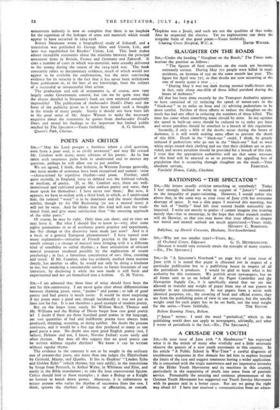Sm,—I am ashamed that three lines of mine should have
been the text for this controversy. I am never quite clear about differentiations between rhyming prose, verse, " poems " and poems ; to talk of good poetry and bad poetry is much easier. It would be most surprising if my poem were a good one, though incidentally it was not put in lines just for fun. It is not therefore a gqod example of modern poetry.
But on the larger issue, surely Sir William Beach. Thomas and Mr. Williams and the Bishop of Dover forget how rare good poetry is? I doubt if there are three hundred good poems in the language, yet vast quantities of bad and indifferent poems have always been produced, rhyming, scanning, or doing neither. No doUbt the process continues, and it would be a fine age that produced as many as one good poem a year. No doubt also most good English poetry (not,. I believe, Hebrew and not, I know, Navaho Indian) scans easily and often rhymes. But does all this suggest that no good poetry can be written without regular rhythm? We know it can be written without regular rhyme.
The evidence to the contrary is not to be sought in the ordinary run of present-day poets,, any more than one judges the Elizabethans by Grimald, Mayne, and Quarles. It lies in Hopkins' " Leaden Echo and Golden Echo " (which rhymes, but very oddly), in the 'translations by Synge from Petrarch, in Arthur Waley, in Whitman and Eliot, and surely in the Bible translations ; to take the least controversial figuret. Critics should look at these examples ; it does a Bishop or a Knight no honour to knock down pawns. Moreover, it is unfortunate to accuse anyone who varies the rhythm of successive lines (no one, I think, ignores the rhythm) of idleness, or affectation, or conceit.
'Hopkins was a Jesuit, and such are_not the qualities of that order. Also he respected the classics. Yet no explanations can deny the irregular form of that good poem.—Yours faithfully,






























 Previous page
Previous page